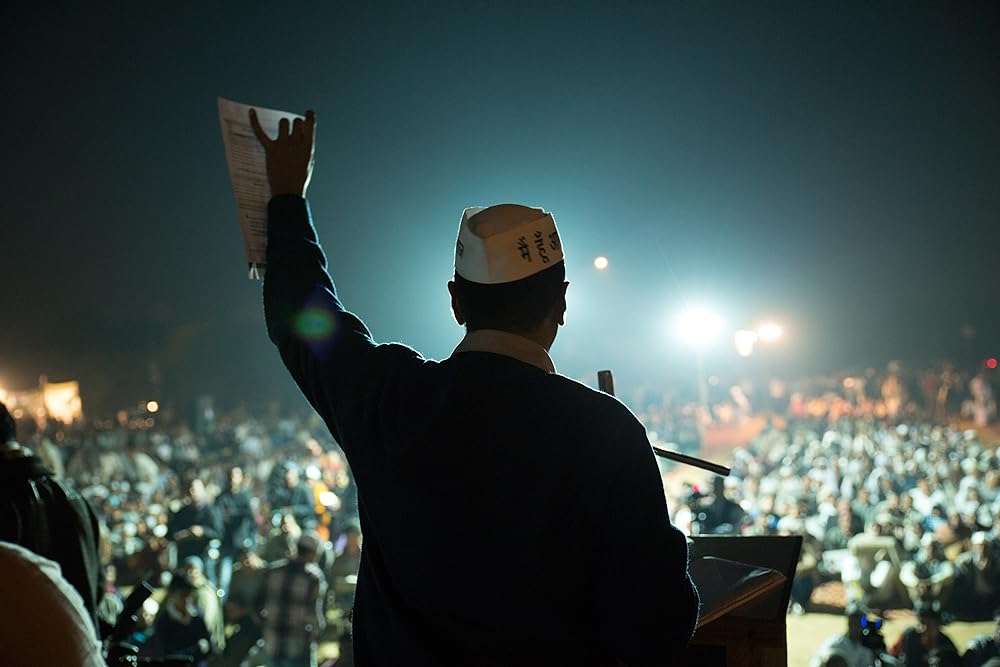What happens when a ragtag bunch of idealists come together and take up the challenge of interrogating the fundamental promises of a democratic constitution? How fares a political party that coalesces around an ideal, that of the decentralization of power and the removal of corruption, even as the rules of the game of electoral politics seem to contradict their lofty ambitions directly? What chance does the disgruntled ‘aam aadmi’ (common person) have of his interests ever being represented when the road to political success seems to be paved with deals struck between wealthy capitalists and corrupt leaders? These questions, and more, motivate Khushboo Ranka and Vinay Shukla’s searing 2016 documentary An Insignificant Man, a look at the rise to power of the Aam Aadmi Party (AAP) within the Indian political scene, helmed by its leader, Arvind Kejriwal.
Shukla teamed up with Ranka and enlisted the help of students and amateur filmmakers in Delhi to document the protests in India surrounding the anti-corruption Jan Lokpal bill in 2011. The way their efforts snowballed into the 95-minute documentary, stitched together from over 400 hours of raw footage, mirrors the film’s story of the power held by the masses coming together to defy all odds, with the film being a product of a massive crowdfunding campaign that raised nearly 600% of its initial target.
Even so, after being made, An Insignificant Man faced further hurdles as the Central Board of Film Certification (CBFC) in India refused to clear it for a theatrical release, demanding NoCs from the prominent names involved and the removal of mentions of the national political parties Congress and the BJP. Refusing to bow down, the filmmakers appealed the decision. Eventually, they managed to overturn the same, with the film finally releasing and getting an 8-week theatrical run, thus becoming the most successful political documentary in the country.
The film’s popular success undoubtedly owes a lot to how its narrative is structured and edited, resembling a thriller rather than a documentary. As Ranka describes in an interview with Ravish Kumar – who, incidentally, is the journalist at the center of Shukla’s latest work While We Watched (2023), documenting media bias in India – she has been pitching their film as being spiritually closer to a fiction feature than a documentary, given that it eschews the typical didactic tone associated with the latter.
Indeed, the filmic narrative seems to follow the familiar three-act structure: showing us the formation of the AAP, followed by the series of crises that it had to face in the run-up to the 2013 Delhi Legislative Assembly elections and culminating in the party’s unprecedented success at the same. Along the ride, we get a rather intimate glimpse into the internal workings of the party, which also reveal the presence of fault lines along which cracks shall develop in the future.
The conflict in the tale is introduced early on, as the group of activists who swore to stay off electoral politics are forced to come together to form the AAP, realizing their goals cannot be met otherwise. The fact that the same people working to realize the “decentralization of political power” (as Kejriwal tells the camera roughly an hour into the film) must first centralize it within one party and one man, thus resembling traditional political parties, becomes the source for further contradictions.
Even as Kejriwal preaches handing over the reins of power to the masses and doing things differently, he must first contradict himself by becoming the face of AAP – which sometimes meant ruling with an iron fist to settle disputes between the various party members. The filmmakers skillfully combine moments in which Kejriwal is seen honoring the people’s mandate through impromptu polls in the streets that are used to arrive at essential party decisions with moments in which he appears to be retreating on his promises in a bid to assert control over the situation.
Whether these troubling contradictions reflect flaws inherent within Kejriwal and his dream or whether they are the inevitable results of having to win a dirty game (against opponents who won’t hesitate to play dirty) before having the chance to clean it up is a question to which the film supplies no easy answers. Ranka and Shukla are clearly fascinated with the AAP phenomenon unfolding before their cameras. Still, they don’t let their admiration get in the way of representing moments of unease within the party offices.

Yogendra Yadav, the Indian activist who was instrumental in AAP’s rise, is seen in the film disagreeing with the party line on several occasions – a foreshadowing, perhaps, of his eventual expulsion from the party when he went on to denounce Kejriwal as a “dictator.” An Insignificant Man aptly represents the Sisyphean burden that the AAP faced, being the ones to take the moral high ground against the corruption of rival factions while not having either the financial capital or the ethical leeway to take shortcuts on their road to the elections.
But, for the most part, An Insignificant Man is a paean to the audacity of hope exhibited by the AAP members, tirelessly working to realize the impossible. And it isn’t just a story of electoral battles but, primarily, ideological ones that crop up within the party as some members turn to old methods, as if almost on auto-pilot, even as they seek new results. Early in the film, there’s an illuminating moment when we see Kejriwal refuting a member’s proposal for a charity project that helps girls from low-income families get married, asserting that charity – apart from being expensive – is no long-term solution to alleviating poverty.
“First we exploit the poor, then we make generous donations,” notes Kejriwal, insisting that the party should instead concentrate on improving their basic income and thereby empowering them by changing the system itself. Inevitably, when the other man responds with the common complaint that “changing the system takes too long,” Kejriwal astutely formulates the revolutionary counter-argument: it is precisely in thinking that changing the system is too difficult, and thus always taking the easier route of charity, that we end up perpetuating the system that oppresses us.
An Insignificant Man takes great care in fleshing out this confrontation between AAP’s revolutionary idealism and the deep cynicism that afflicts the Indian political scene, an antagonism amply leveraged by their opponents when they fail to discredit AAP through other underhand means. One opposition leader claims that “Revolutionaries make great lovers, but lousy husbands,” implying that AAP’s popular momentum will necessarily be short-lived given their refusal to get their hands dirty in securing more significant political capital.
All the negative proclamations attempting to brush off AAP as a legitimate threat only anticipate their astounding future success, as if the film warns its audience of the pitfalls of remaining cynical and averse to change. But even as the other parties anxiously dismiss Kejriwal’s power, their insecurities are revealed through decisions such as the appointment of Dr. Harsh Vardhan, dubbed by a news anchor as “BJP’s Mr. Clean,” as the candidate contesting in Delhi.
Ranka and Shukla exhibit great maturity and a distinct poetic sense in choosing what to keep in the film and how to arrange the material despite the mammoth amount of footage that didn’t make the final cut. A fabricated sting operation intended to cripple AAP’s election momentum is placed alongside images of a gleeful Sheila Dikshit branding it as AAP’s “mu kaala” (blackened face) moment, which itself is followed by a man throwing ink at Kejriwal and literally blackening his face. There are moments when the images speak for themselves, telling a parallel tale, like when the camera pauses to capture Kejriwal’s fingers anxiously fidgeting with the lining of his shirt, even as his words brim with confidence.
The title of An Insignificant Man comes from Kejriwal himself, describing himself as such following his victory when the masses were celebrating him as some Godsent messiah. It hints at the fundamental promise made by AAP that success shall be for the commoner, for the insignificant. Only time can attest to the plausibility of such a promise. But, until then, the film should endure as a reminder of why we should continually interrogate the constitutional promise of democracy, recalling what that oft-abused word actually means, instead of remaining complacent with pushing a button every few years.






![Suffering Of Ninko [2017]: NYAFF Review](https://79468c92.delivery.rocketcdn.me/wp-content/uploads/2017/07/main_suffering_of_ninko_1_pc_courtesy_of_asian_shadows-1600x900-c-default-768x432.jpg)
